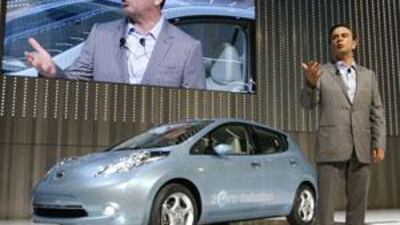ABU DHABI // GCC customers will be among the last to benefit from a global roll-out of electric cars due to the minimal interest shown by the region in using alternative energy vehicles, a car company chief said yesterday.
Carlos Ghosn, the chief executive of Nissan and Renault, was in Abu Dhabi yesterday for the global launch of the 2010 Nissan Patrol 4x4 vehicle. And while he said the Middle East was shaping up to be "the main market" for the Patrol, the reverse is true of Nissan's forthcoming electric Leaf car. "The Middle East is not a prime target for electric vehicles," Mr Ghosn said at a press conference, citing a lack of government interest in the region for zero-emission cars.
"We give priority to governments who are ready to provide incentives for electric cars, like infrastructure," he said. The debut of the new Nissan Patrol, a petrol-engined 5.6-litre V8 luxury SUV with an estimated highway fuel economy of 18 litres per 100km, is the prime focus of Nissan in the Middle East, rather than an early launch of the Leaf. At present, fully electric vehicles are not available in UAE automotive dealerships, although Lexus and Mercedes-Benz are selling luxury hybrids which combine petrol engines with electric motors to lower emissions and fuel consumption.
Mr Ghosn said that the US, Japan, Europe and the UK will be among the first to take delivery of the Nissan Leaf, with the roll-out starting later this year and continuing throughout 2011. "Not a lot of governments in the Middle East came to us and said they were interested," said Mr Ghosn. The Leaf's first production run will be 500,000 vehicles, less than one per cent of the company's global market, Mr Ghosn said. Given the relatively small numbers being distributed worldwide, he said Nissan will be targeting markets that are committed to installing charging stations and providing financial incentives for motorists to switch to zero-emission cars.
"The US, Japan, France and the UK are the major countries who have signed up, and we have cities signing up as well when not necessarily the whole country has signed up, like Mexico City," said Mr Ghosn. "We will focus on countries that are not producers of oil and are concerned with their CO2 emissions." At the World Future Energy Summit held last month in Abu Dhabi, delegates detailed plans in other countries to make the purchase of electric vehicles easier.
Sean Long, an automotive specialist for One North East, a regional development organisation in north-east England, said options include allowing the leasing of batteries, an expensive component of electric cars, and offering cheaper electricity rates to owners of electric cars. In the UK, cash payments of up to £5,000 (Dh29,000) are designed to offset the high prices of electric vehicles. In France, Renault has formed a partnership with EDF, a utilities company, to build a nationwide network of charging stations, with ?400 million (Dh2 billion) contributed by the French government for the project.
The car-rental company Hertz, meanwhile, will add the Leaf to its fleets in the US and Europe by early 2011. Although the infrastructure for fully electric cars is lacking in the UAE, Abu Dhabi Water and Electricity Authority reportedly plans to set up charging points for electric-powered cars and has singled out the Tesla Roadster, an electric sports car, as a vehicle it will help market. At Masdar's carbon-neutral city, 10 electric pod cars are expected to be moving passengers from the city's car park while another three will move freight.
Some capital commuters may need time to adjust to the idea of electric cars. Hassan Ahmad, a 35-year-old electrical engineer from the Palestinian territories, owns a Mitsubishi Pajero and said: "With such modern cars, I don't think I'll exchange my new fast car with an electric one for the environment's sake. Who's concerned about the environment here? People want new, nice and fast cars. They don't care whether it's environmental friendly or not."
However, Essa al Mazroui, a 54-year-old Emirati businessman, would consider exchanging his Nissan four-wheel drive for a more environmentally friendly alternative. "Yes, I sure would buy one," he said. Even if they were slower and more expensive, I would sacrifice that for a cleaner and healthier world." glewis@thenational.ae * With additional reporting by Lynne al Nahhas

